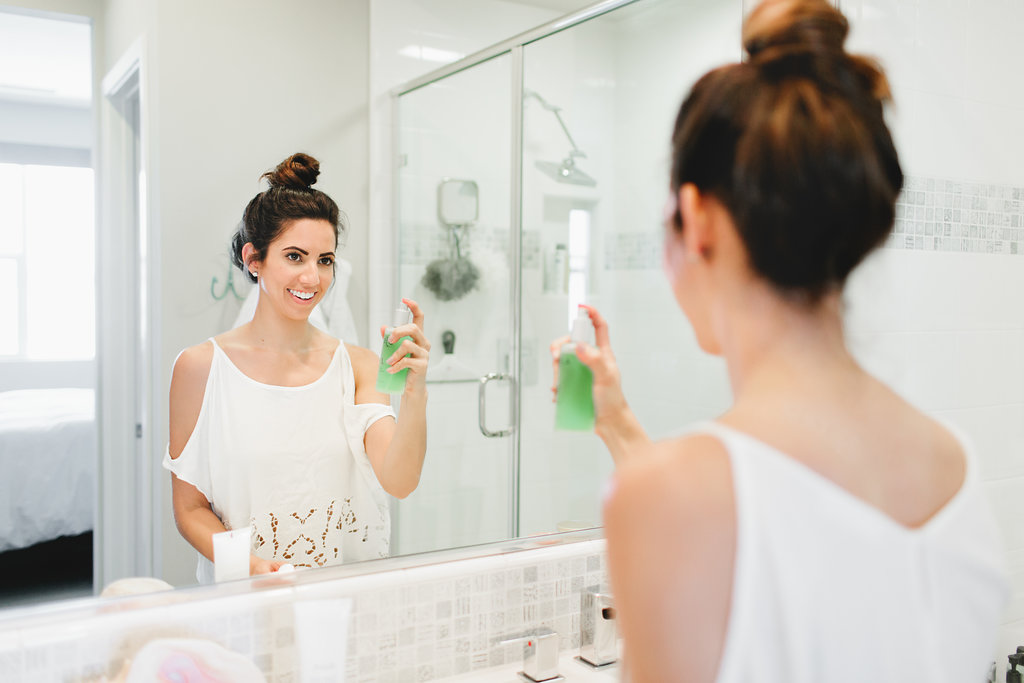Everyone dreams of healthy, glowing skin- especially those who have experienced anything less than. Fortunately, achieving healthier skin can be as simple as making nutrition and lifestyle changes at-home. Learn how to support your skin, instead of working against it!

Common Skin Disorders
Skin disorders, or simply problematic skin, can be frustrating and disheartening, while also taking a stab at your self-confidence. If you’ve ever struggled to achieve healthy, glowing skin, you know exactly what I mean. Skin disorders can be acute (short-term) or chronic (long-term). The most common skin disorders, include:
- Acne
- Eczema
- Psoriasis
- Rosacea
- Hives
- Dry skin/dandruff
- Dermatitis
If you are dealing with a skin disorder, I highly recommend working with a dermatologist to appropriately diagnose and treat, in addition to making these at-home changes. I know A LOT of patients put off seeing a specialist. Yes, it’s difficult to get an appointment sometimes, but take the first step in seeing a dermatologist ASAP.
Causes of Problematic Skin
Unfortunately, today, problematic skin has become the norm. 31 million people in America live with eczema, while up to 55% of adult Americans struggle with acne. I don’t spew these statistics to discourage you, but to know you’re not the only one dealing with frustrating skin issues. Most of us are, too! That said, it’s important to understand the root cause of your skin problems. This is the most effective way to treat symptoms and heal your skin for good! The most common causes of problematic skin, include:
- Imbalances in the gut microbiome
- Underlying infections
- Allergies or sensitivities
- Hormonal imbalances
- Stress
- Extreme weather conditions
Knowing what’s causing your skin disorder is the first step to healing!
5 Lifestyle and Nutrition Tips for Healthier Skin
The conventional approach to skin problems typically includes creams and medications, which can be very helpful in treating symptoms. I am in FULL support of a solid skin product regimen and medications as needed. You can read my routine HERE.
However, there are at-home changes you can implement to support healthy skin, too:
- Hydrate– Drinking enough water is an easy way to fight against dry, problematic skin. Aim to drink half your body weight (pounds) in ounces of water daily. Drinking enough water helps flush out toxins and waste from the body, preventing them from showing up on your skin.
- Limit Sugar– It likely comes as no surprise that a diet high in sugar can increase skin problems, by triggering inflammation. Eliminate processed sugar, like baked goods, candies, and soda. Instead, focus on eating a whole food diet, including natural sugars (ie. fruit and honey).
- Reduce Stress- Easier said than done, right? Stress is the number one contributor to problematic skin of all kinds. Managing emotional stress (toxic relationships, challenging work environments, overwhelming studies, etc.) and physical stress (over-exercising, sedentary lifestyles, eating a processed diet, chronic infections, etc.), can help nip skin issues in the bud.

- Know Your Triggers- Do you know what triggers your skin issues? Specific foods? Emotional stress? Cleaning products? Soaps or detergents? Pet dandruff? Touching your face? Work to understand the factors that trigger your skin flare-ups and eliminate them from your life completely.
- Pro Tip: keep an eye on your pillowcase and change it frequently! Think about it… your skin is spending hours of its life on your pillow, make sure it’s fresh and clean!
- Focus on Gut Health– The gut-skin connection is strong and evident. Imbalances in the gut microbiome can directly lead to skin problems, such as acne and eczema. Support a healthy gut by taking a spore-based probiotic, eating gut-healthy foods (such as fermented foods and bone broth), and address any gut infections or intolerances.
- This is different for everyone, but I noticed a huge improvement in my skin when I eliminated gluten. The benefits on my gut are even bigger, but you get the point; they are related.
Understanding how to support healthy skin at home is the first place to start when facing skin issues. Problematic skin can be a result of our internal or external environments, so it’s important to learn the root cause of your problematic skin.
Note: if these at-home tips don’t improve your skin issues within 4-8 weeks, I recommend working with your dermatologist to find an effective treatment.


